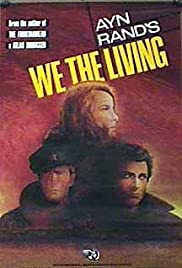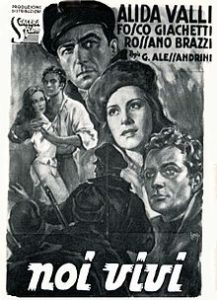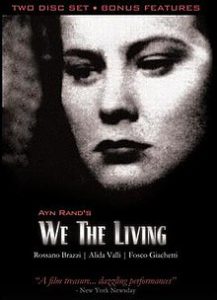We the Living [Noi Vivi] **** (1942, Alida Valli, Fosco Giachetti, Rossano Brazzi) – Classic Movie Review 10,260
Director Goffredo Alessandrini’s 1942 Italian romantic war film We the Living [Noi Vivi] stars Alida Valli and Rossano Brazzi and Fosco Giachetti, who give outstanding performances in this tale of the difficult web of relationships that occur against the odds in a story set in Soviet Russia and directly critical of that regime, but really an indictment of any kind of dictatorship. It is a good and important film but the story behind it is perhaps even more interesting.
Noi Vivi is a stunning social document made in Italy in the middle of World War Two, premiered at the Venice Film Festival, shown to great box-office success for two months on its Italian theatrical release, and then repressed by the Italian Government after Italian newspapers complained it was anti-Fascist.
The films were pulled from cinemas and ordered to be destroyed but they survived by the skin of their teeth. Massimo Ferrara, the studio chief of the production company Scalera Films, hid the negatives with a close friend, and sent the negatives of another Scalera film to authorities to be destroyed.
The 38-year-old star Fosco Giachetti plays the Communist Andrei Taganov, the 21-year-old Alida Valli plays Kira Argounova and Rossano Brazzi plays the aristocratic Leo Kovalensky, all three giving luminous performances. Both men are in love with Kira.
It was originally made as two films, Noi Vivi [We the Living] and Addio Kira [Goodbye Kira], after Alessandrini abandoned the original script and decided to make the film without a finished script. As the script was written the day before filming or directly from the novel, more material was shot than could be edited down to one film, so it was decided to release the film as two separate movies.
Leading Italian director Goffredo Alessandrini and his young associate Anton Giulio Majano knew their film film was supposedly anti-communist but actually anti-authoritarian but hoped they would be safe from the Fascist authorities because of the story’s negative portrayal of Italy’s wartime enemy the Soviet Union. It was approved for filming through the intervention of Benito Mussolini’s son. Some pro-Fascist lines were added to the film and the film’s editors hid any sensitive material when Government officials demanded to see the film dailies.
The screenplay by Oreste Biancoli and Corrado Alvaro is based on the 1936 novel by Ayn Rand, who at the time lived in the United States, making it impossible to buy the rights. Shot on their sound stages in Rome by Scalera Films, it was made without the novelist’s consent or knowledge, and no attempt was made to compensate her later, though Rand eventually received wartime reparations from the Italian Government for the theft of her property.
Rand learned of the piracy of her novel after the war, and although she admired the films, she resented the distortion of her message. She declined to grant the literary rights, so efforts to re-release the film ended, then Scalera Films went out of business and the films vanished.
The film was long lost and forgotten until Rand’s lawyers, Erika Holzer and Henry Mark Holzer went to Italy in search of the films and in the summer of 1968 found a business that owned dozens of vintage Italian films had the original films. The film was restored and re-edited with Rand’s involvement. The two Italian films were combined into a single film with English subtitles. Subplots were cut to bring the films down from four hours to 172 minutes. The film was edited to be more faithful to Rand’s novel, and Fascist propaganda, a distortion of Rand’s message, was edited out. It was then finally released in cinemas for the first time in the United States, Canada and overseas in 1986, for the first time outside Italy since the war.
Currently it looks more relevant than ever.
Also in the cast are Fosco Giachetti, Giovanni Grasso, Emilio Cigoli, Cesarina Gheraldi, Evelina Paoli and Guglielmo Sinaz.
We the Living [Noi Vivi] is directed by Goffredo Alessandrini, runs 172 minutes (1986 re-release), is made by Scalera Film, is written by Anton Giulio Majano, Goffredo Alessandrini, Oreste Biancoli and Corrado Alvaro, based on the novel by Ayn Rand, is shot in black and white by Giuseppe Caracciolo, and is scored by Renzo Rossellini.
© Derek Winnert 2020 Classic Movie Review 10,260
Check out more reviews on http://derekwinnert.com





